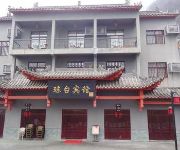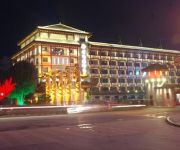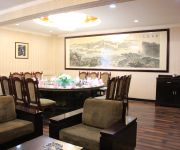Facts and Data
Webpages:
Official Unesco Page
Basis Data:
Unesco World heritage since: 1994
Size of heritage:
Coordinates:
Longitude: 111,000°
Latitude: 32,467°
Summary
The palaces and temples which form the nucleus of this group of secular and religious buildings exemplify the architectural and artistic achievements of China's Yuan, Ming and Qing dynasties. Situated in the scenic valleys and on the slopes of the Wudang mountains in Hubei Province, the site, which was built as an organized complex during the Ming dynasty (14th–17th centuries), contains Taoist buildings from as early as the 7th century. It represents the highest standards of Chinese art and architecture over a period of nearly 1,000 years.
Location on Map
Show bigger map on Openstreetmap
Ancient Building Complex in the Wudang Mountains
The Ancient Building Complex in the Wudang Mountains is a UNESCO World Heritage site located in Danjiangkou City, Hubei Province, China. Nestled amidst the picturesque Wudang Mountains, this complex is renowned for its exceptional architectural and cultural significance. It encompasses a vast area of approximately 327 hectares and is home to numerous ancient buildings, temples, and palaces.
History
The history of the Ancient Building Complex in the Wudang Mountains dates back over a thousand years. It was initially constructed during the Tang Dynasty (618-907 AD) and further expanded during the Ming Dynasty (1368-1644 AD). The complex served as a spiritual retreat and a center for the practice of Taoism, a Chinese philosophical and religious tradition.
Emperor Zhu Di of the Ming Dynasty played a pivotal role in the development of the complex. He believed that the Wudang Mountains possessed a unique spiritual energy and ordered the construction of numerous temples and palaces. The complex became a hub for Taoist teachings and practices, attracting scholars, monks, and pilgrims from across China.
During the Qing Dynasty (1644-1912 AD), the complex faced significant damage due to wars and neglect. However, restoration efforts were initiated in the late 19th century, and the complex was gradually revived to its former glory.
Current State
Today, the Ancient Building Complex in the Wudang Mountains stands as a testament to the rich cultural heritage of China. It is divided into two main sections: the South Complex and the North Complex.
The South Complex is the spiritual heart of the complex and is home to the famous Golden Hall, also known as the Zixiao Palace. This magnificent structure, adorned with intricate carvings and vibrant colors, is dedicated to the Taoist god Zhenwu. The South Complex also houses the Yuzhen Palace, the Purple Cloud Palace, and the Nanyan Palace, among other significant buildings.
The North Complex, situated on the northern slope of the mountains, is equally impressive. It features the magnificent Taihe Palace, which served as the main residence for the emperors during their visits to the Wudang Mountains. The North Complex also includes the Zhanqifeng, a towering peak that offers breathtaking panoramic views of the surrounding landscape.
The Ancient Building Complex in the Wudang Mountains attracts thousands of visitors each year, including both tourists and Taoist practitioners. It is not only a place of historical and architectural significance but also a center for the practice of martial arts. The Wudang Mountains are renowned for their association with the development of Wudang martial arts, which blend Taoist philosophy with physical movements.
Efforts are continuously made to preserve and protect this UNESCO World Heritage site. Conservation projects focus on maintaining the structural integrity of the buildings, protecting the surrounding natural environment, and promoting sustainable tourism.
The Ancient Building Complex in the Wudang Mountains stands as a remarkable testament to China's rich cultural and architectural heritage. Its historical significance, stunning natural surroundings, and spiritual ambiance make it a must-visit destination for those seeking to explore the wonders of ancient China.
Hotels and places to stay
Qiongtai Hotel - Wudangshan
Laoying International Hotel
Jinjiang Inn- Bengbu Shengli Road
TaiHeXuanWu Hotel
Wudangshan Xuanyue Inn
ZHONGJING TAICHI LAKE INTERNATIONAL HOTE
Wudangshan Qiaojiayuan Hotel
Wudangshan Tianbao Jiuru Hotel
Videos from the area
Videos provided by Youtube are under the copyright of their owners.










